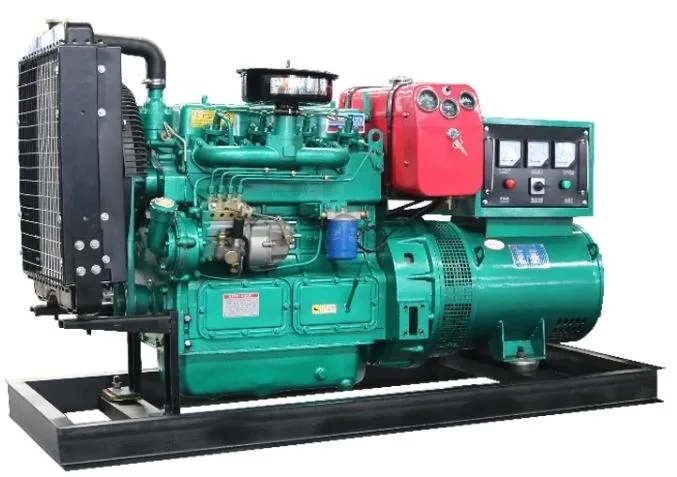Introduction
The stability and reliability of the power grid are crucial for modern society's functioning. Power outages can have significant economic, social, and safety implications. In the event of a widespread blackout, restoring power quickly and efficiently becomes paramount. One critical aspect of power grid resilience is the ability to perform a black start, which involves restarting the grid without any external power source. Diesel generators play a vital role in providing black start capability, ensuring the rapid restoration of power in emergencies. This article explores the importance of diesel generators for black start capability and their role in enhancing power grid resilience.
Understanding https://www.lkpowerplant.com/400kw/ refers to the ability of a power system to restart and re-energize itself without relying on external power sources. This capability is essential in situations where a widespread blackout has occurred, and the entire grid is without power. Black start procedures are typically activated following a cascading failure, severe weather event, cyber-attack, or other emergencies that result in a total grid shutdown.
During a black start scenario, traditional power sources such as transmission lines, substations, and generators are unavailable. Therefore, alternative sources of power are needed to kickstart the system and begin the process of restoring power to critical infrastructure and end-users. Diesel generators are commonly used for black start applications due to their reliability, fast startup times, and ability to provide immediate power when needed.
Role of Diesel Generators in Black Start Capability
Diesel generators are a versatile and dependable source of backup power that can be deployed quickly in emergency situations. Their ability to start and reach full capacity within seconds makes them ideal for black start applications. Diesel generators utilize an internal combustion engine to convert diesel fuel into mechanical energy, which is then converted into electrical power through an alternator.
In a black start scenario, diesel generators can be connected to critical infrastructure such as hospitals, emergency response centers, water treatment plants, and other essential facilities to provide immediate power. These generators can also be used to energize key components of the power grid, such as substations and distribution networks, enabling the gradual restoration of power to wider areas.
Key Features of Diesel Generators for Black Start Capability
1. Rapid Startup: Diesel generators are designed to start quickly and reach full capacity within seconds, making them well-suited for black start applications where time is of the essence.
2. Fuel Efficiency: Diesel generators are known for their fuel efficiency, allowing them to provide sustained power over extended periods without requiring frequent refueling.
3. Reliability: Diesel generators are robust and reliable, with a proven track record of performance in various operating conditions. This reliability is essential during black start scenarios, where uninterrupted power supply is critical.
4. Scalability: Diesel generators come in a range of sizes and capacities, allowing for scalability based on the power requirements of the application. This flexibility enables diesel generators to meet the diverse needs of different black start scenarios.
5. Remote Monitoring and Control: Many modern diesel generators are equipped with remote monitoring and control capabilities, allowing operators to monitor performance, diagnose issues, and adjust settings from a centralized location. This feature enhances the operational efficiency and reliability of diesel generators in black start applications.
Case Studies: Diesel Generators in Black Start Scenarios
1. Hurricane Katrina (2005): Following the devastation caused by Hurricane Katrina, large parts of the Gulf Coast region were left without power. Diesel generators played a crucial role in the black start process, providing emergency power to critical infrastructure and aiding in the rapid restoration of electricity services.

2. Northeast Blackout (2003): The Northeast blackout of 2003 affected over 50 million people in the United States and Canada. Diesel generators were instrumental in the black start efforts, enabling the gradual re-energization of the grid and minimizing the impact of the outage on essential services and businesses.
3. Fukushima Daiichi Nuclear Disaster (2011): In the aftermath of the Fukushima Daiichi nuclear disaster in Japan, diesel generators were deployed to provide backup power to cooling systems at the damaged nuclear plant. Despite the challenges posed by the disaster, diesel generators helped maintain essential functions and mitigate further risks.
Future Trends and Innovations
The importance of black start capability and the role of diesel generators in enhancing power grid resilience are expected to grow in the coming years. As the frequency and severity of extreme weather events, cyber-attacks, and other emergencies increase, the need for reliable backup power solutions will become more critical.
Innovations in diesel generator technology are also shaping the future of black start applications. Advancements in engine efficiency, emissions control, remote monitoring, and integration with renewable energy sources are driving the evolution of diesel generators for black start capability. Hybrid systems that combine diesel generators with energy storage solutions such as batteries are also being explored to improve overall system resilience and efficiency.
Conclusion
Diesel generators play a vital role in providing black start capability and ensuring the rapid restoration of power in emergency situations. Their reliability, fast startup times, scalability, and fuel efficiency make them well-suited for black start applications where immediate power supply is essential. As the power grid faces increasing challenges from natural disasters, cyber threats, and other risks, the importance of diesel generators for black start capability will continue to grow. By investing in robust backup power solutions and incorporating innovative technologies, power systems can enhance their resilience and reliability, ultimately safeguarding critical infrastructure and ensuring the continuity of essential services.
